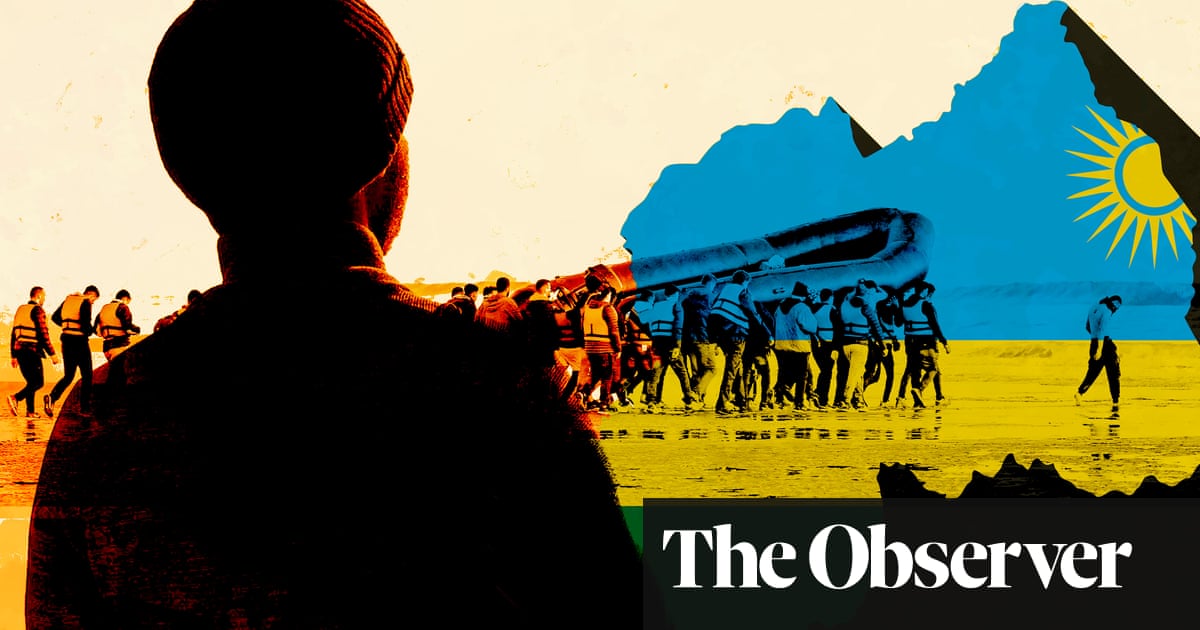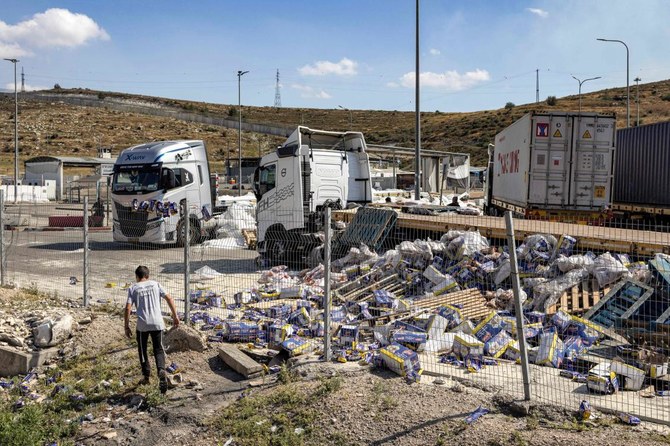
Last October, as the five law lords in the supreme court were hearing the government’s plea that it was safe to deport asylum seekers to Rwanda, an official in the Home Office was about to press the button on a decision whether to allow a refugee to make a home in Britain.
The man had fled his home country fearing he and his family were at serious risk of harm. The Home Office agreed that he was in danger of persecution and granted him safe refuge in the UK.
The regime he and his wife escaped from was President Paul Kagame’s Rwanda.
“We accept that you have a well-founded fear of persecution and therefore cannot return to your country Rwanda,” said the Home Office letter sent to the refugee, who had links to the country’s political opposition.
An investigation by the Observer and Led by Donkeys reveals the Home Office has given asylum to four Rwandans in the last four months who claimed they were at risk from the regime. These decisions have not yet been recorded in official figures.
The investigation also reveals details of an intelligence file which charts the extraordinary drive to burnish the image of Kagame’s regime, allegedly with the help of a London public relations company, and the tactics used to discredit its critics.
The Rwandan granted asylum along with his wife on 12 October, the day after hearings concluded in the supreme court, supports a political opposition party. Even now, at a secret location in the UK, he still fears for his safety and asked for anonymity. He also fears for those seeking refuge in this country who may be sent to the African state.
“When they take people to Rwanda, at first it will be fine,” he said in an interview with the Observer. “But as soon as they start claiming their rights – for example, if they want to stage a demonstration – they will be in big trouble.”
Five days after this decision, officials signed off another ruling on a young Rwandan man. They concluded he also had a “well-founded” fear of persecution, according to the decision letter seen by the Observer.
The asylum seeker is also at a secret address but met the Observer last week. He considered he may be targeted by the regime over a relative’s suspected links to the opposition.
“If you complain about the government in Rwanda, security services will be at your door,” he said.
“Rwanda is a very well-organised, very well-camouflaged dictatorship.”
On 24 November, officials made another decision, this time giving asylum to a woman from Rwanda, according to information provided by the Greater Manchester Immigration Aid Unit. The regime tried to force her to work for Rwandan intelligence, but she refused and feared she was at risk.
These decisions undermine prime minister Rishi Sunak’s claim that Rwanda is safe for asylum seekers. The policy to remove people to the African state was announced in April 2022 to help deliver the government’s pledge to stop the arrival of small boats crossing the English Channel.
In the aftermath of a civil war and the 1994 genocide in which about 800,000 Tutsis were killed by Hutus, Kagame came to power and has been president since 2000. At the last election in 2017, which Amnesty International said took place in a “climate of fear and repression”, Kagame was re-elected with 99% of the vote.
His government, however, has been credited with growing the economy and pulling millions out of poverty. Tony Blair, the former British prime minister, described Kagame as a visionary leader and said the country has gone on a remarkable “path of development”.
The Rwandan government has said allegations of human rights abuses are “frankly insulting”. While it bridles at the criticism, it faces allegations this weekend that it has been involved in online attacks to undermine its foreign critics.
In March 2021, the British author Michela Wrong published a book on Rwanda which won plaudits from the critics for exposing the “dark underside” of the country. Do Not Disturb: the Story of a Political Murder and an African Regime Gone Bad was shortlisted for the Orwell prize, but publication turned into a frightening ordeal.
Wrong was derided, smeared and vilified by online trolls. It was claimed she had been paid by Ugandan intelligence to write her book, and that she was a racist and a genocide denier.
Wrong had a compelling story to tell about former Rwandan intelligence chief Patrick Karegeya, who was strangled to death in a hotel room in Johannesburg in January 2014. South African police identified four suspects who they said were “directly linked” to the Rwandan regime.
The Observer and Led by Donkeys have seen the details of a dossier compiled by a western intelligence agency on the campaign against Wrong, alleging the attacks in the UK were orchestrated by the Rwandan regime.
It claims employees at the London-based PR firm Chelgate, which advised the regime, set up anonymous social media accounts, accusing her of racism and campaigning for her book launch to be cancelled. The file does not link Chelgate to the most scurrilous posts targeted at Wrong. Chelgate this weekend denied operating sock puppet accounts or being involved in trying to no-platform Wrong.
Chelgate employees also helped set up the website Rwandafacts.com. In 2021 it published an article and a YouTube video denying that hotelier turned human rights activist Paul Rusesabagina, whose efforts in saving more than 1,200 people from death were portrayed in the film Hotel Rwanda, had been kidnapped by agents of the Rwandan government. The UN later concluded he had indeed been abducted and arbitrarily detained.
In September, Chelgate chair Terence Fane-Saunders admitted to an undercover reporter that his firm had been advising the regime on its public relations strategy, yet despite the official line he considered Rusesabagina had been kidnapped. “Things happen in Rwanda … People have disappeared who have been captured,” he explained. “Critics can be locked up.”
The online invective towards Wrong prompted security concerns. In April last year, an event she was due to hold at a Paris hotel was cancelled because of security concerns. The next month organisers of a talk in Brussels changed venue after a storm of abuse on social media. In 2022, a South African thinktank, the Institute for Security Studies, cancelled a Pretoria event after complaints from Rwandan officials.
Wrong is not the first journalist to have been targeted. Some have endured more significant security concerns, but there is no evidence any PR firm or any company linked to the Rwandan regime was involved.
The Canadian writer Judi Rever, a former Agence France-Presse reporter, has faced years of online harassment and threats during her work on Rwanda. In December 2013, she published an investigation in the Foreign Policy Journal which examined the record of Kagame’s troops and allegations of death squads. Her work has been controversial because of her allegations about the scale of the alleged war crimes by the Rwandan Patriotic Army, the armed wing of Kagame’s Rwandan Patriotic Front.
She recounts how, five days after the article was published, a message was left on her answerphone at her family home in Montreal. It was a woman’s voice simulating the sounds of an explosion and gunfire. She then said the name of Rever’s six-year-old daughter, according to an account in Rever’s award-winning 2018 book In Praise of Blood.
Seven months later, Rever arrived in Belgium to conduct research on Rwanda and was told by state security officials there was intelligence of a threat from the Rwandan regime. “I was driven to all my interviews and was accompanied by two armed bodyguards,” she told the Observer.
Anjan Sundaram, author of Bad News: Last Journalists in a Dictatorship, says foreign critics of the regime face an “army of online trolls” and intimidation. His book lists more than 50 journalists who have been killed, disappeared, assaulted, arrested, expelled or treated inhumanely since 1995.
When Sundaram was in England in 2016 to promote his book, he was visited by two Scotland Yard detectives and given a hotline to call in the event of any security threats. “This is a very sophisticated and capable dictatorship,” he said. “You don’t feel safe, even if you are outside Rwanda.”
Lewis Mudge, central Africa director at Human Rights Watch, said: “[The UK government] knows about the political opponents who are rounded up, held incommunicado and tortured, many of whom never appear again. They know it’s a sham democracy.”
The 2022 US state department human rights report on Rwanda warned there were credible reports of unlawful killings and arbitrary detention, and of the repression of individuals outside the country, including killings, kidnappings and violence. It also said sources had reported the government often enlisted individual as “proxies” to harass critics online.
Fane-Saunders denied that Chelgate had operated any “sock puppet” campaign against Wrong, and he strongly opposed any attempts to no platform people. He confirmed that Chelgate had previously worked with Rwanda on its international communications and he remained an admirer of the country and its government’s efforts to rebuild it. Fane-Saunders said it was wrong to state that he considered Rusesabagina had been kidnapped. He said he was “speaking lightly” at the time, and the definition of kidnapping might depend on jurisdiction. He said the firm had helped to set up the Rwanda Facts website to provide an information resource about the country.
The Home Office says Rwanda has a track record of welcoming asylum seekers and looking after refugees, and the supreme court recognised changes could be made to make its partnership work. A Home Office spokesperson said it did not comment on specific cases. The High Commission of Rwanda did not respond to a request for comment.












